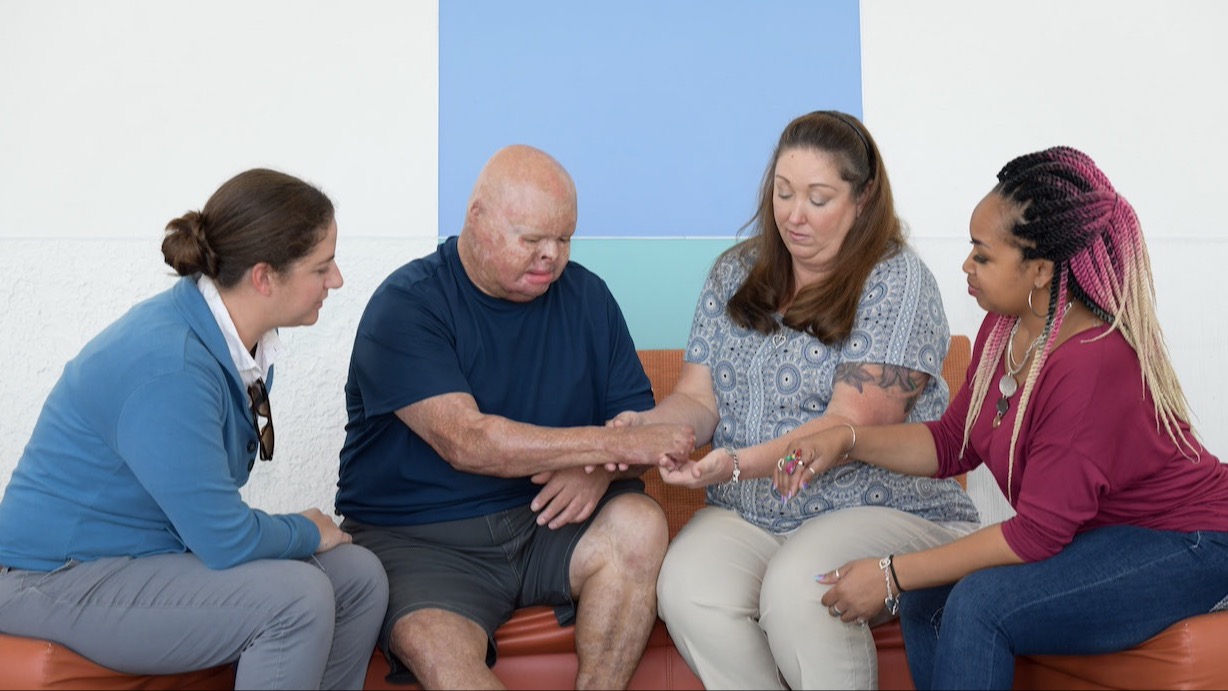How Burn Centers & Organizations Can Get Involved with the Phoenix Society SOAR Program
Written on July 21, 2022
For burn survivors who are reeling from the early implications of their treatment and recovery, community is everything. Learning from and listening to peers in the community can offer healing and comfort at a time when survivors need it most.
But where to begin? For most burn survivors, their real journey starts at the hospital, when they first receive news about the severity of their burns and their preliminary treatment plan. There’s so much information and content to digest within a short time, and burn survivors can easily feel overwhelmed without the right support system.
This article explains how burn centers can get involved with the Phoenix Society’s Phoenix SOAR Program to provide immediate, relevant peer support for their patients when they need it most.

What is Phoenix SOAR?
Phoenix SOAR (Survivors Offering Assistance in Recovery) is a peer-to-peer support network that connects survivors and loved ones with others who have experienced similar trauma, whether through their own burn injury or as the loved one of a burn survivor.
Through the program, Phoenix SOAR peer supporters offer knowledge, compassion, and a listening ear as those new to the community grapple with their new reality. Peer supporters participate in a training program to provide the best assistance. Training courses are now completely virtual and offered on a prescheduled basis. The curriculum includes four hours of course modules, along with quizzes and live coursework.
What are the benefits of joining SOAR as a hospital or foundation?
As the first point of contact with burn survivors, hospitals need to know how they can best support their patients during and after their hospital stay. Peer Support provides immediate emotional assistance and better prepares your patients for the road ahead.
Burn related foundations have been critical to the Phoenix SOAR Program, as they are serving those who are in rural areas or not affiliated with a burn center. Phoenix SOAR Peer Support can now happen out in the community, as well as at the bedside.
Improved Survivor Outcomes
As a study published in the Journal of Burn Care and Research concluded, Phoenix SOAR support groups and individual pairings foster psychological and emotional healing for burn survivors. And as additional scientific studies have revealed, there is indeed a correlation between psychological distress and longer hospital stays following a burn injury, where longer stays indicate longer wound healing time.
Volunteers to Assist the Burn Team
Another benefit for hospitals is the opportunity to train peer support volunteers as an extension of the burn team. Whereas medical professionals are equipped to manage and monitor the physical treatment of their burn patients, peer supporters can step in to offer emotional support. Together, these teams can mediate and strategize recovery that is holistic and in keeping with a burn survivor’s overall mental, emotional, and physical well-being.
Structured Volunteer Programming
Phoenix SOAR is just the entry point for many health organizations that hope to enlist the services of volunteer programs. Since Phoenix SOAR is a well-established volunteer program, hospitals and clinics have the added benefit of learning from and incorporating the tools and training Phoenix SOAR uses to educate new volunteers.

How can burn centers get involved?
Burn centers play a vital role in promoting and facilitating Phoenix SOAR peer support at healthcare facilities. Phoenix Society for Burn Survivors has provided healing for the burn community since 1977. Phoenix SOAR was designed by a national advisory team of healthcare professionals and burn survivors to provide a structured volunteer peer support program for patients like yours.
We’re proud to partner with 85+ burn centers across the United States, Canada, and New Zealand to bring the emotional and psychological peer support so many burn survivors need. Learn more about our process and how you can get started.
Application and Screening Process
Healthcare or burn related organizations that wish to partner with the Phoenix Society must consider these preliminary requirements for joining the Phoenix SOAR program:
Obtain a letter of support from the medical director of the burn program.
Identify a minimum of two lead coordinators. One coordinator must be a member of the burn team.
Obtain financial commitment from administration.
Pay a one-time start-up fee of $5,000. This fee covers:
Two virtual trainings: an initial Phoenix SOAR Coordinator training and Peer Supporter training (burn survivors/loved ones only)
Note: Both Coordinator and Peer Supporter trainings must be completed within one year of program initiation
Materials for the initial coordinator and peer supporter trainings
The opportunity to participate in national research groups for Phoenix SOAR
After the start-up fee, pay a $1,500 annual fee and submit annual program reports to maintain active program status and use the digital evaluation to maintain active membership status.
Curriculum
Curriculum topics for the Phoenix SOAR Peer Support training course include the following:
Information about the program
Model of recovery process for patients and families
The role and responsibilities of a peer supporter (boundaries, ethics)
Tips for working in a hospital setting or community setting
Communication skills for peer supporters
Communication skills for helping roles
Education on how to make referrals, handle difficult situations, offer peer support via virtual connection, and use the digital evaluation.
If you want to learn more about bringing the Phoenix Society’s SOAR program to your area, we’d be happy to discuss. Get in touch with our team to learn more about the peer programming that may be right for you.
Disclaimer: The stories featured on this website are personal accounts shared by individuals from the burn community. Each burn injury, recovery journey, and healing process is unique. These stories are meant to offer connection, insight, and hope but are not intended as medical advice. What worked for one person may not be appropriate for others. The perspectives shared in these stories do not necessarily represent the views of Phoenix Society for Burn Survivors. If you have medical questions or concerns, please consult a qualified healthcare professional.